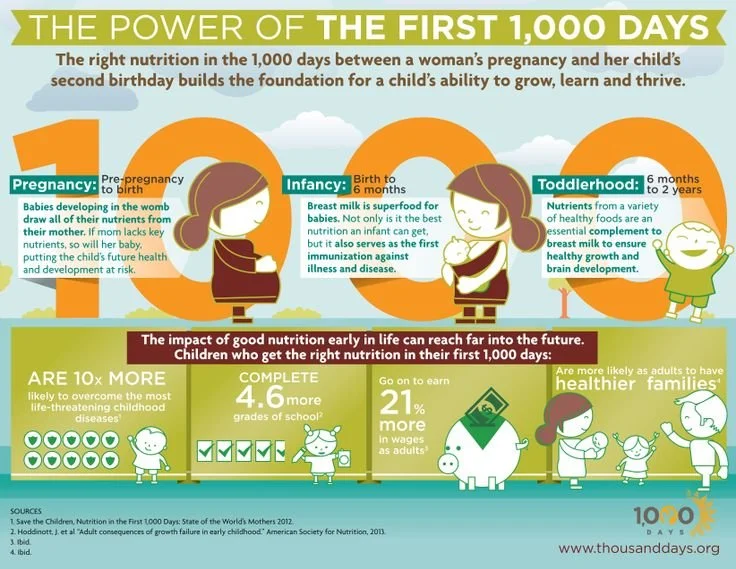The Crucial Role of Nutrition in the First 1000 Days
The first 1000 days, spanning from conception to a child's second birthday, are a period of remarkable growth and development. During this time, proper nutrition is essential to support rapid growth, brain development and overall well-being.
Nutrition helps lay the groundwork before conception
A mother’s diet and her pre-pregnancy nutritional reserves provide the primary nourishment for the developing foetus, highlighting the importance of considering diet and nutrient intake before conception. Prioritising nutrients such as folate, iron, iodine and omega-3 fatty acids ahead of pregnancy, can support fertility, optimise early development and lay a strong foundation for a healthy pregnancy.
Nutrition supports rapid development in early pregnancy
In the early stages of pregnancy, the brain develops rapidly, beginning as a simple neural tube around weeks 6-7. By week 7, it grows at an astonishing rate—producing around 250,000 new brain cells every minute. This rapid growth forms the foundation for the brain’s complex functions, setting the stage for cognitive and motor skills later in life.
Maternal nutrition is essential during this time, with nutrients like folate, iron, choline, omega-3 fatty acids, and vitamin D playing key roles in supporting brain growth and structure.
Breastfeeding helps build a strong foundation in the first 6 months (and beyond)
Breast milk is a dynamic substance that provides infants with a complete source of nutrition that supports growth, brain development and immune function in the early stages of life. It’s composition can vary depending on the stage of lactation, the mother’s diet and even the time of day. Rich in antibodies and growth factors, breast milk helps establish a healthy gut microbiota, while also offering protection against infections, allergies, and long-term health conditions like obesity and type 2 diabetes.
To support a mother’s breastfeeding journey, it’s important that she is well-hydrated, well-nourished, and consumes sufficient calories. Special attention should be given on key nutrients like protein, calcium, omega-3 fatty acids, iodine, and vitamin D, which play in an important role in both her health and milk production.
The introduction of solid foods from 6 months
From around six months of age, infants typically start to show readiness for solid foods, marking a new phase in their nutritional journey. While breastfeeding continues to provide essential nutrients and immune protection, the introduction of complementary foods is crucial to support infant’s continued growth and development.
Key nutrients such as iron, vitamin A, C and D become increasingly important. Iron-rich foods are especially critical, as an infant's iron stores begin to deplete around six months. Introducing a variety of foods, feeding skills and textures helps to ensure a balanced diet but also supports chewing skills and oral motor development .
Key considerations
Eating a varied, balanced diet is the best way to ensure both you and your baby are getting all the necessary nutrients.
Supplements, specifically vitamin D and folic acid, are recommended before and during pregnancy.
It is also recommended that breastfed babies be given a vitamin D supplement from birth. From 6 months, they should receive supplements containing vitamins A, C, and D, unless they consume more than 500ml of formula milk per day (as formula is already fortified with these nutrients).
If you follow a vegan or vegetarian diet, it can be harder to get sufficient nutrients from plants sources such as iodine, iron, omega-3 fatty acids and vitamin B12. Supplements may be needed for the mother, especially during pregnancy and breastfeeding. Additionally, during weaning, if baby is following a similar plant-based diet, supplementation may also be necessary.
If you’re concerned about your nutrient intake or unsure whether you need supplements, consult with your GP, midwife, or a registered dietitian/nutritionist for personalised advice.


